|
|
|

|
Changing What's Possible: 2010 Year in Review
|
Growth
SCRA innovation center
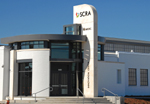 The
South Carolina Research Authority (SCRA), MUSC and the City of
Charleston held a grand opening ceremony for the SCRA MUSC Innovation
Center at 645 Meeting St. The fully-renovated facility attracts and
supports start-up companies with wet lab and equipment space, primarily
in concert with entrepreneurs commercializing MUSC research. The
South Carolina Research Authority (SCRA), MUSC and the City of
Charleston held a grand opening ceremony for the SCRA MUSC Innovation
Center at 645 Meeting St. The fully-renovated facility attracts and
supports start-up companies with wet lab and equipment space, primarily
in concert with entrepreneurs commercializing MUSC research.
Bone health center
South Carolinians at risk for osteoporosis can benefit from the
expertise of a multidisciplinary team of specialists. These specialists
can assist with early detection and provide comprehensive care through
MUSC’s new Center for Osteoporosis and Bone Health.
Renovated
cafeteria
 After
nine months and some unforeseen infrastructure
construction delays, the first phase of MUSC’s renovated cafeteria and
dining facility opens for business. New features include an expanded
menu offered in food stations including soup and salad bar, grill and
world cuisine. After
nine months and some unforeseen infrastructure
construction delays, the first phase of MUSC’s renovated cafeteria and
dining facility opens for business. New features include an expanded
menu offered in food stations including soup and salad bar, grill and
world cuisine.
Strategic
alliance formed
Building upon a well-established history of collaboration, Georgetown
Hospital System and MUSC announced a new strategic affiliation
agreement that will expand local access to medical services, expertise
and clinical support offered by MUSC.
Pharmacy
innovation center
The Kennedy Pharmacy Innovation Center was established through a $30
million gift to the university’s South Carolina College of Pharmacy,
the second-largest in the university’s history.
Neuroangio
suite
A $2.5 renovation of the neuroangio’s suite more than doubled its size,
enabling MUSC to handle its growing caseload and further establish its
reputation in delivering high-tech neurological care.
People
Daring
rescue
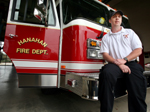 A routine trip
to MUSC from Orangeburg turned into a life-saving event
Wednesday when two members of a Meducare ambulance crew used a rush of
adrenaline to pull James Burrell out of his badly damaged, burning van. A routine trip
to MUSC from Orangeburg turned into a life-saving event
Wednesday when two members of a Meducare ambulance crew used a rush of
adrenaline to pull James Burrell out of his badly damaged, burning van.
College
of Dental Medicine
MUSC’s new 120,000 square-foot clinical education center is named in
honor of President Emeritus James B. Edwards, DMD, during Dental Alumni
Weekend Feb. 27.
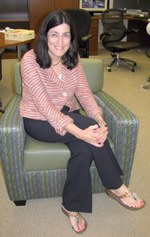 College
of Medicine dean College
of Medicine dean
MUSC announced the appointment of Etta D. Pisano, M.D., making her the
college’s first female dean.
Pharmacy
student graduates
Jean Hilaire, PharmD, finishes pharmacy program despite the loss
of his mother and sister to a Magnitude 7 earthquake in Haiti.
Finance
Cigarette
tax
MUSC supports cigarette tax increase to protect children from smoking
and to shift more of the estimated $1
billion in costs of the annual tobacco-related diseases back to
smokers.
Record
donations
Philanthropic contributions to MUSC increased to a record $76.7 million
during fiscal 2010, despite adverse economic conditions and a national
decline in giving to nonprofits.
Research
funding grows
Despite a fiscally-challenging year, MUSC continued a record-breaking
trend regarding research funding. Research awards surpassed the $200
million mark for the third year in a row with a $16.6 million dollar
increase since 2009. The 2010 total of $234,153,146 includes
approximately $136 million from the National Institutes of Health.
HCC
breast cancer funding
Researchers from the Hollings Cancer Center (HCC) won a $1.4 million
grant from the U.S. Department of Defense to enhance breast cancer
research at MUSC.
Quality
Autism
spectrum outreach
MUSC takes the lead in establishing programs to serve children on the
spectrum, such as Project Rex, and to establish a multidisciplinary
center to serve them.
MUSC
telemedicine hub
 Robert
Adams, M.D., neurologist and pioneer of telemedicine at MUSC,
forms medical partnerships with the REACH Network to save lives. Robert
Adams, M.D., neurologist and pioneer of telemedicine at MUSC,
forms medical partnerships with the REACH Network to save lives.
Neurological
advances
Daily transcranial magnetic stimulation—an intervention that uses
magnetic currents to activate certain brain areas—appears to help
induce remission in patients with treatment-resistant depression,
according to research by Mark S. George, M.D., MUSC Distinguished
University Professor and director. May 28
Obesity
research
Obese teens are likelier to have unsafe sex, according to a study by
Margaret S. Villers, M.D., and colleagues. She hopes efforts can raise
awareness and promote intervention efforts.
Baby
boot camp
Fathers learn to bond in a special program targeted to the needs of new
dads.
Office
of Industry Partnerships
The office supports MUSC entrepreneurship, which will help state
patients benefit from new cures, treatments and therapies for cancer,
diabetes, cardiovascular diseases and a variety of serious illnesses.
Electronic
health care records
MUSC moves to electronic health records,
which help reduce medical errors, bring down costs and ensure privacy.
Changing
what’s possible
With the rollout of a statewide comprehensive communications campaign
Aug. 12, MUSC will show how it is “changing what’s possible.”
Service
Gamma Knife
Center
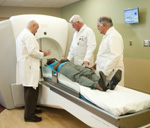 MUSC
leadership celebrates the opening of the Gamma Knife Center with
an open house Jan. 27. The Gamma Knife, which is available for clinical
use, can treat complicated and once inaccessible tumors with a precise
dose of radiation. MUSC
leadership celebrates the opening of the Gamma Knife Center with
an open house Jan. 27. The Gamma Knife, which is available for clinical
use, can treat complicated and once inaccessible tumors with a precise
dose of radiation.
University
Mail Services
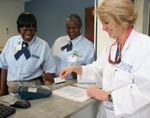 A new center
for University Mail Services opened. It is a
self-supporting mail preparation and processing center for outgoing
nonprofit and standard mail. A new center
for University Mail Services opened. It is a
self-supporting mail preparation and processing center for outgoing
nonprofit and standard mail.
Haiti
Relief Fund
Karen Cellars of Laboratory Services recommended that MUHA authorize
paid time off transfers be allowed for the MUSC Haiti Relief Fund. As a
result, medical center employees donated $23,101 to the fund via the
Coastal Community Foundation.
Survivor’s
Bell
Kendall Hall, 5, rings the newly-erected Survivor’s Bell on the sixth
floor of Hematology/Oncology in Rutledge Tower.
SCTR
Pilot Project Program
Scientists and clinical and translational investigators affiliated with
the South Carolina Clinical & Translational Research Institute
(SCTR) can apply for funding of up to $50,000 per year to support their
research through the SCTR Pilot Project Program.
Legislative
agreement
Cancer patients who could benefit from participation in clinical trials
got good news. A voluntary agreement with insurance companies announced
May 18 at the Statehouse will ensure the coverage of routine care costs
for patients enrolled in cancer clinical trials.
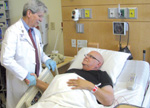 1,000th
marrow transplant 1,000th
marrow transplant
Robert Stuart, M.D., and staff celebrated the milestone of MUSC
treating the 1,000th bone marrow transplant patient when Charles Dabney
successfully underwent treatment.
CDAP
offers school outreach
 Suzanne
Thomas, Ph.D., lifts a dripping brain out of a bucket to the
fascination of many of the fifth graders gathered at Whitesides
Elementary School in Mount Pleasant to learn how alcohol and drugs can
affect the brain. Suzanne
Thomas, Ph.D., lifts a dripping brain out of a bucket to the
fascination of many of the fifth graders gathered at Whitesides
Elementary School in Mount Pleasant to learn how alcohol and drugs can
affect the brain.
Pharmacy
college “graduates”
When the Accreditation Council for Pharmacy Education issued its most
recent report on Accreditation Action and Recommendations, it announced
the South Carolina College of Pharmacy had been granted full
accreditation.
New
board of trustees officers
During the August MUSC board of trustees meeting, trustees voted to
approve a new chairman and vice-chairman for a two-year period.
HeartMate
destination therapy site
MUSC became a final or destination therapy site for patients who could
benefit from the HeartMate II, which offers mechanical circulatory
support therapy for heart patients. MUSC received distinction from the
Joint Commission as a VAD (ventricular assist device) Center of
Excellence.
To see more pictures, visit http://www.musc.edu/pr/2010review.
Friday, Dec. 24, 2010
|
|
|



 The
South Carolina Research Authority (SCRA), MUSC and the City of
Charleston held a grand opening ceremony for the SCRA MUSC Innovation
Center at 645 Meeting St. The fully-renovated facility attracts and
supports start-up companies with wet lab and equipment space, primarily
in concert with entrepreneurs commercializing MUSC research.
The
South Carolina Research Authority (SCRA), MUSC and the City of
Charleston held a grand opening ceremony for the SCRA MUSC Innovation
Center at 645 Meeting St. The fully-renovated facility attracts and
supports start-up companies with wet lab and equipment space, primarily
in concert with entrepreneurs commercializing MUSC research. After
nine months and some unforeseen infrastructure
construction delays, the first phase of MUSC’s renovated cafeteria and
dining facility opens for business. New features include an expanded
menu offered in food stations including soup and salad bar, grill and
world cuisine.
After
nine months and some unforeseen infrastructure
construction delays, the first phase of MUSC’s renovated cafeteria and
dining facility opens for business. New features include an expanded
menu offered in food stations including soup and salad bar, grill and
world cuisine.  A routine trip
to MUSC from Orangeburg turned into a life-saving event
Wednesday when two members of a Meducare ambulance crew used a rush of
adrenaline to pull James Burrell out of his badly damaged, burning van.
A routine trip
to MUSC from Orangeburg turned into a life-saving event
Wednesday when two members of a Meducare ambulance crew used a rush of
adrenaline to pull James Burrell out of his badly damaged, burning van.

 Robert
Adams, M.D., neurologist and pioneer of telemedicine at MUSC,
forms medical partnerships with the REACH Network to save lives.
Robert
Adams, M.D., neurologist and pioneer of telemedicine at MUSC,
forms medical partnerships with the REACH Network to save lives.  MUSC
leadership celebrates the opening of the Gamma Knife Center with
an open house Jan. 27. The Gamma Knife, which is available for clinical
use, can treat complicated and once inaccessible tumors with a precise
dose of radiation.
MUSC
leadership celebrates the opening of the Gamma Knife Center with
an open house Jan. 27. The Gamma Knife, which is available for clinical
use, can treat complicated and once inaccessible tumors with a precise
dose of radiation. A new center
for University Mail Services opened. It is a
self-supporting mail preparation and processing center for outgoing
nonprofit and standard mail.
A new center
for University Mail Services opened. It is a
self-supporting mail preparation and processing center for outgoing
nonprofit and standard mail. 
 Suzanne
Thomas, Ph.D., lifts a dripping brain out of a bucket to the
fascination of many of the fifth graders gathered at Whitesides
Elementary School in Mount Pleasant to learn how alcohol and drugs can
affect the brain.
Suzanne
Thomas, Ph.D., lifts a dripping brain out of a bucket to the
fascination of many of the fifth graders gathered at Whitesides
Elementary School in Mount Pleasant to learn how alcohol and drugs can
affect the brain.